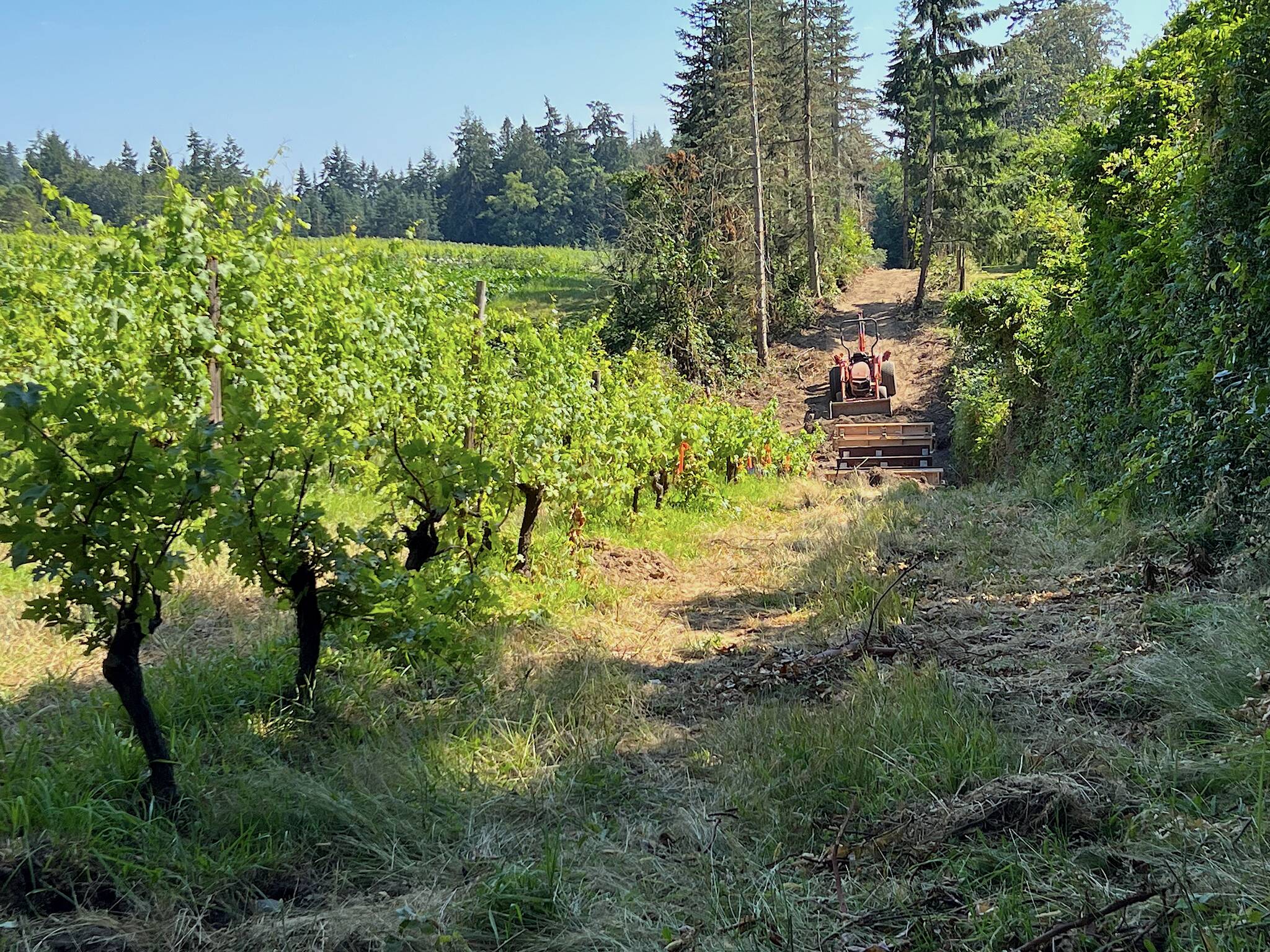Mike Lempriere, owner of Perennial Vintners, sees people hiking past his property daily as they follow a well-established trail that winds around neighboring farms.
Recently, the winemaker has been watching construction crews working on the new city Farm Trail that he fears will bring more people to the area. He’s not even sure why it’s needed because of an already established nearby path.
“The path is completely redundant,” Lempriere said.
He fears more than just the potential of people damaging his crops. The trail is too close to three farms that jeopardize their organic certification, running through a wetlands area, and it is being built upon public farmland that was purchased for “agricultural purposes only.”
The Farm Trail is being built upon an old unused county road that runs alongside the city-owned Morales Farm, Butler Greens, the Bentryn and Suyematsu Farms aka Bainbridge Farms, Bainbridge Vineyard Winery and the Grace Church property. Perennial Vintners is in the predicament of being located between public farming spaces.
Lempriere has raised his concerns at the past two City Council meetings. He’s asked the project be put on hold until his concerns are addressed. But the city plans to complete the Farm Trail by end of the summer.
Barb Trafton, Bainbridge Parks & Trails Foundation projects director, said the Farm Trail is part of the city’s Sustainable Transportation Plan.
“The goal was to find ways to allow the public to actually see this beautiful farmland that is public lands … The city not only owns the farmland but also the places where the right of way is adjacent to the farmland,” she said.
Trafton, who added that her team met numerous times with Friends of the Farms, which manages and leases the public farmland, said that the public record to purchase the open space included a trail and farmstand.
“The community voted (in 2001) for an $8 million public open space,” and a committee of people wrote a detailed description for the purchase of the land, which mentions a trail, she said, adding fencing will be installed on the west side of the trail to keep deer out of the farm area.
Public Works director Chris Wierzbicki said there is historical documentation for the right of way use of the old county road.
The documents say agricultural parcels owned by the city are of interest to the community and require access trails and point-of-interest viewing locations. The city and the park district are constructing a trail system that would connect the farm properties. The city’s Non-Motorized Transportation Plan includes plans for construction of such facilities in the area. In addition, portions of the property not dedicated to agriculture may serve low-impact public uses.
Recently, trail work was halted when a wetlands area was discovered, and the city is working on permitting for mitigation at that part of the trail. Wierzbicki also mentioned that a bridge is under construction at the northern end of the trail that connects to Day Road, providing access to Suyematsu Farm.
Another concern of Lempriere’s is spraying crops close to the Farm Trail. Public and salmon safety is a high priority for him. He is worried about the impact of spraying his organic crops during growing season when hikers and bikers are on the trail. He uses copper sulfate to fight powdery mildew that is prevalent in the area and threatens his vines. If they can’t spray, the farms could lose their organic certifications.
Wierzbicki said the farmers will have to be aware of public safety and use of materials similar to the way that the city maintains property adjacent to public access.
Lempriere said he won’t be able to spray within 50 feet of the trail.
Perennial Vintners is known for its light, crispy Melon de Bourgogne wine made from cool-weather grapes that originate from the Loire Valley in France. He’s the only person in the state growing them on .6 acre of vines but they are less than 30 feet from the Farm Trail. For optimum fruit production to make 7,200 bottles of wine each year, Lempreier needs to spray his vines every 10 days or up to 14 times throughout the growing season.
Lempriere is concerned that his neighbors with greenhouses less than 50 feet from the trail could also lose their organic certification.
About 15 years ago, Lempriere offered his driveway as an alternate path, but the city preferred a view trail.
“We’re trying to help provide access for trails, because trails are one of the most popular amenities on this island. And if you get people out on the land or near the land, they see it, and they care for it. So, it’s also a conservation method and they’re socioeconomic health benefits all the way around with increasing our public trail system,” Trafton said.
Ultimately, Lempriere fears he will have to remove some of his rare grapes to maintain his organic growing practices. “That would mean I have to remove three rows, or give up on my salmon safe certification…I am salmon safe certified, and that is meaningful,” he said.



